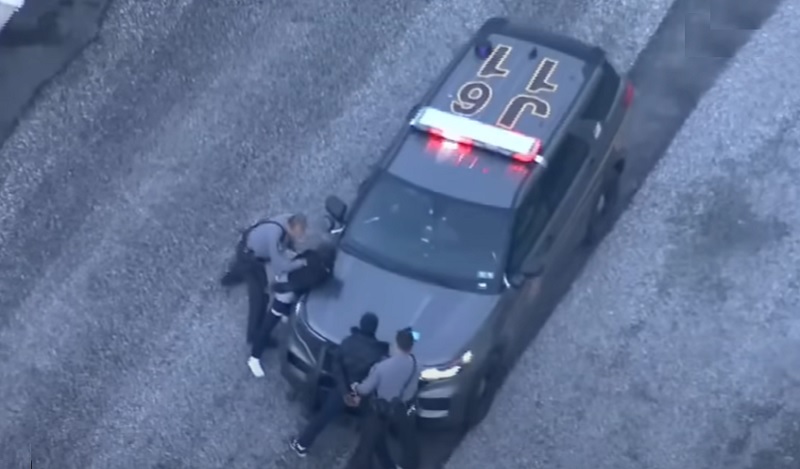
By Steve Pomper
I’m reading True Believer, a book written by former U.S. Navy SEAL Jack Carr from his James Reece series about an ex-Navy SEAL. This book series generated the immensely popular TV series, The Terminal List, starring Chris Pratt, based on the series’ first novel.
The character evolves throughout the book series, going from a somewhat pristine idealist to a skeptical, even cynical, if somewhat tainted idealist. As much as he is driven by patriotism and honor, he is demoralized by just how evil some people, especially those in government authority, can be (sound familiar?).
But, as good as they are, I’m not here to discuss the books or TV series. A comment the character Reece made about maintaining the moral high ground, as I tried to do, going from naïve to skeptical to cynical about government authorities, inspired this article.
After Reece tells a former SEAL sniper partner that he believes he’s lost the moral high ground, his partner says, “It was interesting, though, Reece. Everyone who came from working with you always was a bit more thoughtful about it. They said you talked about the importance of maintaining the moral high ground to differentiate us from our enemies. I don’t think they got that from many others.”
His partner also told Reece, “Just because you broke a few laws doesn’t mean you lost the moral high ground. You always held that territory.” His buddy emphasizes Reece broke laws but only to hold murderers, including (spoiler alert) those who killed his family and other SEALS, accountable. His “lawbreaking” harmed no innocents. Law and morality don’t always meet. The Soviets and Nazis had plenty of laws but very little morality—or justice.
But what does maintaining the moral high ground mean, not only for protagonists in fiction but for cops in real life?
As a cop, I felt maintaining the moral high ground was important. Essentially, I didn’t want to be a hypocrite. It was important not to intentionally break minor laws where later I could issue a citation to someone for doing the same thing I did.
I’m not talking about being some ingratiating “boy scout” who doesn’t understand discretion. I’m talking about doing things as simple as choosing to avoid jaywalking. Because who was I to enforce jaywalking ordinances if I routinely jaywalked? Obviously, this applies to all laws, but, like most ordinarily law-abiding people, minor infractions can happen.
When I was a field training officer (FTO), I told my students if I issued a ticket after I’d done the same thing recently, I’d be a hypocrite. So, there are two ways to handle this conundrum: Don’t violate the ordinances or don’t enforce them. And, speaking of morals, the first option is, admittedly, morally superior to the second. But at least the second doesn’t make you a hypocrite, but there’s that pesky obligation to do your duty thing.
Sometimes it’s difficult. For example, being from Massachusetts, I understand jaywalking as an urban art form, but still wanting to maintain the moral high ground as a cop, I should avoid routinely jaywalking (even if done artfully), right?
Incidentally, I recall not writing a great number of jaywalking tickets in over two decades on the force. And those were either when assigned to an emphasis patrol or for what we called “talking yourself into a ticket” by being a jerk. But, by the end of my career, an officer could wind up fired or even criminally charged after enforcing what started as a minor violation, which the violator turned into a felony crime.
Take a 2021 incident in Orange County California that was touted as police excessive force. Vice.com reported, “Homeless Black Man Fatally Shot by Sheriff’s Deputy After Jaywalking.” That’s weird because if you watch the video you’ll see the headline overlooked the man is uncooperative and aggressive, assaulted deputies early on, and eventually attempted to get one cop’s gun, which is when the other officer shot him.
But in places like Seattle, it’s tough to gauge the moral high ground so much of it has been ceded by radical leftist governments. It’s no longer about a cop worrying about being a hypocrite because the City Council doesn’t even want cops to enforce many laws.
The radical leftists punish the cops if any incident goes sideways, never giving cops the benefit of the doubt but heaping it on the bad guys. This makes cops almost reckless to do their jobs in many circumstances. But, as an institution, the Seattle City Council relinquished the moral high ground long ago.
I’m not saying admitting to ever doing this myself. However, any statutes of limitations have long expired. Although, since I’m a conservative-libertarian and not an untouchable radical leftist, would our current two-tiered criminal justice system still come after me? After all, the radical leftists in government offices have demonstrated quite clearly, they could not care less about maintaining the moral high ground either.
Fortunately for American communities, whether the residents appreciate the cops or not, most officers care about maintaining the moral high ground. Institutions like leftist city governments could not care less. That’s why they have no clue what good, moral police work looks like. No clue.